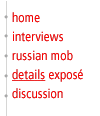
 | 


 Nicknamed "Slava," Fetisov starred for the Central Red Army Team for more
than a decade before breaking away to join the NHL's New Jersey Devils in 1989.
"I had played for the Red Army," Fetisov explained at the start of his first
NHL season. "I had won world championships and the Olympics. There was
nothing left to prove anymore. Playing in the NHL was the next plateau for me.
That's why I came." Fetisov played for the Devils for six seasons before being
traded to the Detroit Red Wings, where he joined several of his old Central Red
Army teammates and helped Detroit win back-to-back Stanley Cups in 1997 and
1998. In the early 1990's, during an investigation of Vyacheslav Ivankov -- a
man believed to be a major leader of Russian organized crime in North America -- the FBI discovered a link to the star NHL defenseman: Fetisov had signed a
document stating he was the President of Slavic Inc., a front company for
Ivankov's illegal enterprises. Fetisov is currently an assistant coach with his
former team, the New Jersey Devils. (read his interview)
Nicknamed "Slava," Fetisov starred for the Central Red Army Team for more
than a decade before breaking away to join the NHL's New Jersey Devils in 1989.
"I had played for the Red Army," Fetisov explained at the start of his first
NHL season. "I had won world championships and the Olympics. There was
nothing left to prove anymore. Playing in the NHL was the next plateau for me.
That's why I came." Fetisov played for the Devils for six seasons before being
traded to the Detroit Red Wings, where he joined several of his old Central Red
Army teammates and helped Detroit win back-to-back Stanley Cups in 1997 and
1998. In the early 1990's, during an investigation of Vyacheslav Ivankov -- a
man believed to be a major leader of Russian organized crime in North America -- the FBI discovered a link to the star NHL defenseman: Fetisov had signed a
document stating he was the President of Slavic Inc., a front company for
Ivankov's illegal enterprises. Fetisov is currently an assistant coach with his
former team, the New Jersey Devils. (read his interview)



 At eighteen, Pavel Bure was already a star with the Central Red Army team and
was asked to sign on for three more years. Bure decided instead to follow a
number of other stars from the Red Army Team to the NHL. In 1991, Bure signed
with the Vancouver Canucks. His star rose rapidly: Dubbed the "Russian
Rocket," Bure put together two stellar 60-goal/100 point seasons. As early as
1993, however, Bure was mentioned in reports of NHL players being extorted by
Russian organized crime. Later, Bure was linked as a friend and business
associate of Anzor Kikalishvili, the head of the 21st Century Association, a
sports/entertainment marketing company that law enforcement officials believe
is a front for illegal activities. Bure is beginning his eighth NHL season,
now playing for the Florida Panthers.(read his interview)
At eighteen, Pavel Bure was already a star with the Central Red Army team and
was asked to sign on for three more years. Bure decided instead to follow a
number of other stars from the Red Army Team to the NHL. In 1991, Bure signed
with the Vancouver Canucks. His star rose rapidly: Dubbed the "Russian
Rocket," Bure put together two stellar 60-goal/100 point seasons. As early as
1993, however, Bure was mentioned in reports of NHL players being extorted by
Russian organized crime. Later, Bure was linked as a friend and business
associate of Anzor Kikalishvili, the head of the 21st Century Association, a
sports/entertainment marketing company that law enforcement officials believe
is a front for illegal activities. Bure is beginning his eighth NHL season,
now playing for the Florida Panthers.(read his interview)



Valeri Kamensky grew up in Voskresensk, Russia -- a small town some fifty
miles from Moscow which has produced some of the nation's best hockey players.
In 1991, Kamensky became the second player from Voskresensk to make the move to
the NHL, landing with the Quebec Nordiques. Kamensky reportedly
played a key role in helping a reputed Russian mobster, Vyacheslav Sliva, enter
Canada in 1994. Kamensky is said to have prevailed upon Quebec Nordique officials
to officially request a visa for Sliva, whose criminal background could
potentially have blocked his travel. In their letter of reference, the
Nordiques claimed that Sliva "is a friend of one of our players." Kamensky
starred for several years with the Colorado Avalanche, the name of the
relocated Nordique franchise, helping the Avalanche to a Stanley Cup. In July,
1999, Kamensky signed a rich four-year $17 million contract to play for the New
York Rangers.



In 1993, during the summer off-season following his rookie year for the Los Angeles Kings, Alexei Zhitnik was targeted for extortion in his native Kiev, Ukraine. His new-found celebrity, and his
widely reported $400,000 salary, made the talented young defenseman a target
for extortionists. The attempt proved unsuccessful. Later, Zhitnik was unusually frank in speaking about extortion, a
topic that few players discuss. "If you pay the first time, the next time you
pay much more," he told the Los Angeles Times in December, 1993. "But
my friends helped me. Like the police -- the cops can't do nothing. No rules.
No laws." Zhitnik now plays for the Buffalo Sabres.



In 1994, at age eighteen, Oleg Tverdovsky was drafted by the NHL's Mighty
Ducks, a Disney-owned franchise in Anaheim, California. Tverdovsky
was the second pick in the draft; his starting salary -- $4.2 million for his
first three years -- was one of the largest ever paid to a rookie. On January
30, 1996, Tverdovsky's mother Alexandra was kidnapped from her home in Donetsk,
Ukraine, and was held for ransom. The leader of the kidnappers was
one of Tverdovsky's former minor league hockey coaches in the Ukraine.
According to a Donetsk police official, the man, identified only as "Nikolai
V.," visited Tverdovsky's lavish home in Anaheim, seeing for himself the riches
that come to a young NHL star, and decided he deserved a share. Of the
extortion attempt, Tverdovsky later told a Canadian newspaper: "This was my
problem and I was supposed to take care of it. Sometimes it bothered me and it
was tough to play." After eleven days, Tverdovsky's mother was released; the
kidnappers were caught and put on trial. Tverdovsky's parents moved to the
United States. Tverdovsky now plays for the Mighty Ducks of Aneheim.



Dubbed "Alexander the Great" for his sensational hockey skills, Mogilny, at
age twenty, was considered the best young player on the Soviet Central Red Army
Team. Immediately after helping the team to the 1989 World Championship,
Mogilny defected to the United States -- flying from Stockholm Sweden, the site
of the hockey tournament, to New York's JFK airport. After a brief
international intrigue over the unprecedented defection -- he was widely
reviled as a traitor -- Mogilny settled in Buffalo, where he began a rocky few
years of play for the Sabres before settling into more consistent all-star
performance. In early 1994, Sergei Fomitchev, a former associate of Mogilny's
who helped the player defect to the United States and briefly lived with him in
Buffalo, attempted to extort Mogilny. Fomitchev approached the star NHL player
for $150,000 - $200,000. Mogilny turned to the FBI and the plot was foiled. Fomitchev served two months in an Erie County jail
before being deported. Mogilny currently plays for the Vancouver Canucks.

home |
interviews |
russian mob in north america |
details expose |
ivankov: taking a closer look |
video excerpt |
join the discussion
glossary |
links |
who's who |
tapes & transcripts |
synopsis |
press
FRONTLINE |
pbs online |
wgbh
New Content Copyright © 1999 PBS Online and WGBH/FRONTLINE
 | |